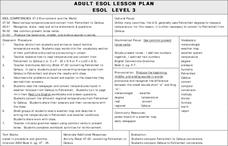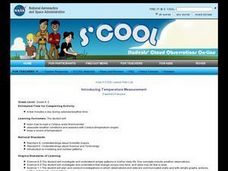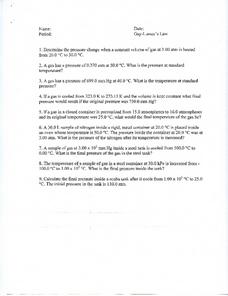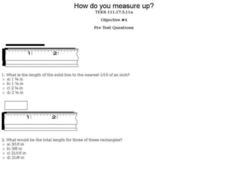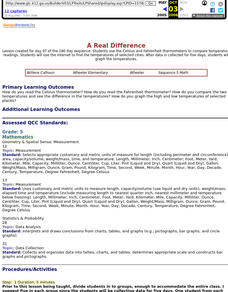Curated OER
Temperature Conversions
Students discuss the different between the English system of measurement and the metric system. Working ins mall groups, students read the weather map. They convert temperatures from one measurement system to another.
Curated OER
Introducing Temperature Measurement
Students explore temperature and use Celcius thermometers to measure and graph the temperature in the classroom daily. They estimate what they think the temperature might be and then find the actual temperature in the room.
Curated OER
What is Water?
Students examine water's properties. They participate in hands-on activities to show the properties of water.
Curated OER
Gay-Lussac's Law
In this Gay-Lussac's Law worksheet, students determine the pressure change when a constant volume of gas is heated. Then they identify what the pressure is at standard temperature. Students also determine and calculate the final pressure...
Chicago Botanic Garden
Climate Change Around the World
Look at climate change around the world using graphical representations and a hands-on learning simulation specified to particular cities around the world. Using an interactive website, young scientists follow the provided...
Pleasanton Unified School District
Temperature Review Worksheet
Young scientists examine how temperature is measured in both Fahrenheit and Celsius in a box in a weather science worksheet. They write equivalent temperatures in four examples and write the temperatures shown on four thermometers...
Curated OER
Kelvin Temperature Scale
For this Kelvin temperature worksheet, students write Celsius degrees and Kelvin temperatures and vice versa. Students complete 17 problems.
Curated OER
Make Your Own Thermometer
Students recognize the concept of temperature, including degrees, and the melting and freezing process. In this 1st - 2nd grade lesson plan, students identify the temperature of various objects, as well as create their own paper...
Curated OER
How Do You Measure Up? Measurement Multiple Choice
In this measurement worksheet, students complete 10 multiple choice questions that included questions about measuring time, degrees, length, area and perimeter.
Curated OER
Boyle's Law
In this Boyle's Law worksheet, students respond to several short answer questions that pertain to Boyle's Law. They determine the volume of gas when pressure is increased and/or decreased. Students also determine what the volume will...
Curated OER
CONCEPTS IN NUMBER THEORY.
Students study the Maya culture and their achievements in mathematics, how bacteria grow exponentially, use rational numbers to convert back and forth between Celsius and degrees Fahrenheit, how some architectural designs are examples of...
Curated OER
A Real Difference
Fifth graders use the Celsius and Fahrenheit thermometers to compare temperature readings. They use the Internet to find the temperatures of selected cities. After data is collected for five days, 5th graders graph the temperatures.
Curated OER
What is a Cloud
Third graders study clouds and how they are formed. They write acrostic poems about clouds and analyze and graph temperature data collected during varying degrees of cloud cover.
Texas State Energy Conservation Office
Investigation: Gas Laws in Action - Propane
Using helium as an example of propane, physical science middle schoolers experiment with and graph the relationship between temperature and volume in gases. In a whole-class demonstration, they show how molecules behave under different...
Santa Monica College
Introducing Measurements in the Laboratory
We use basic units of measurement to break down things and communicate clearly. The first activity in an 11-part series teaches the proper way to measure various items. It starts simply with measuring the dimensions and areas of...
Science Geek
Bulk Properties of Water
Learn the ins and outs of the properties of water through an engaging slide show. The lesson presents different facts about water including phase change, heat of fusion, heat of vaporization, and specific heat among others.
Science Geek
Thermochemical Calculations
Viewers learn where the heat goes when phase changes take place with a presentation that explains the latent heat of phase changes, or, more specifically, the molar heat of fusion, solidification, vaporization, and condensation. The show...
Curated OER
Busted Bubbles
Using the scientific method, and bubble gum, learners conduct a motivating experiment. After conducting a series of tests involving bubble gum, they graph and analyze their results. This is the type of activity everyone loves.
K5 Learning
The Sun and the Stars
How are the stars similar to the sun in our galaxy? Learn all about the solar system with a reading excerpt about the sun and the stars. Kids read an informational passage before they answer questions about reading comprehension,...
Polar Trec
Beacon Valley Weather
In Beacon Valley, katabatic winds regularly knock fit adults to the ground. The instructional activity compares the actual temperatures to the wind chill after factoring in katabatic winds in Beacon Valley. Scholars learn to calculate...
Curated OER
Using Graphs
Print and use this useful unit on basic algebraic functions, domain, range, and graphing. Tasks include, illustrating simple functions with a graph, and identifying the domain and range of the function. This twelve-page packet contains...
Gatsby Charitable Foundation
Four Activities Using Straight Line Graphs
This math packet includes four different activities which puts linear equations and line of best fit in the context of real world applications. Each activity uses a different linear math modeling equation and asks the learners to...
Illustrative Mathematics
Writing Constraints
Use this resource to present your number crunchers with how to write a constraint equation and to determine viable solutions. The price of an object limits the amount that can be purchased. The speed at which you walk limits the number...
NOAA
Ocean Zones
How can organisms light up in water? Bioluminescence is light produced in a chemical reaction that can occur in an organism's body. First, learners determine what happens to light/color as you move into the deep ocean. In groups, they...


